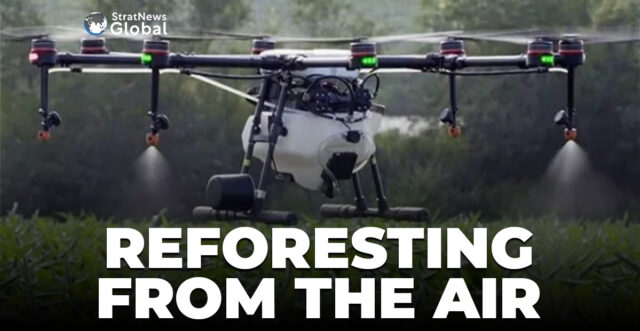In a pioneering initiative near Kosovo’s capital, Pristina, drones are being employed to disperse seeds to reforest areas devastated by illegal logging and wildfires.
These drones distribute linden and pine seeds encapsulated in soil over barren hillsides, aiming to restore the lush forest landscapes that have been severely depleted.
This reforestation effort is critical as the demand for wood, particularly for traditional wood-fired stoves, continues to contribute to the loss of forests.
The environmental consequences of deforestation are severe, endangering the survival of native wildlife including brown bears, lynx, roe deer, and wild goats, all of which are seeing diminishing populations in Kosovo.
According to a report by Sustainability Leadership Kosova (SLK), Kosovo loses over 700 hectares of its forest each year, a staggering rate that necessitates immediate action.
SLK has partnered with the Croatian firm Project 02 to utilise drone technology for seed dispersal, a method that proves to be five times faster than traditional planting.
This technique not only speeds up the reforestation process but also ensures access to remote and difficult terrains that might otherwise be unreachable.
“We need to act swiftly as our forests are at stake,” stated Indira Kartallozi, founder of SLK, during an operation in the village of Butovc. She highlighted the urgency of their mission, noting that on that day alone, 500 seed balls were released.
This initial drop serves as a precursor to a more extensive reforestation campaign planned for the autumn.
Each drone flight distributes approximately 100 seed balls, consisting of a blend of clay, sand, waste biomass, and minerals that shield the seeds from potential threats like insects or rodents.
It takes about two hours for a drone to plant one hectare, with each hectare requiring between 2,000 to 5,000 seed balls, depending on the seed type.
Lara Vukasovic from Project 02 explained the efficiency and effectiveness of this method, noting that drones can plant in any terrain, particularly those inaccessible by humans.
She mentioned that about 25-30% of the seeds successfully germinate, hence the strategy of planting multiple times the number needed.
This innovative reforestation technique is not only applicable in Kosovo but has also been adopted in various parts of the world including the United States, Brazil, Africa, and Europe, demonstrating a global response to the rapid loss of forests.
With Inputs From Reuters





